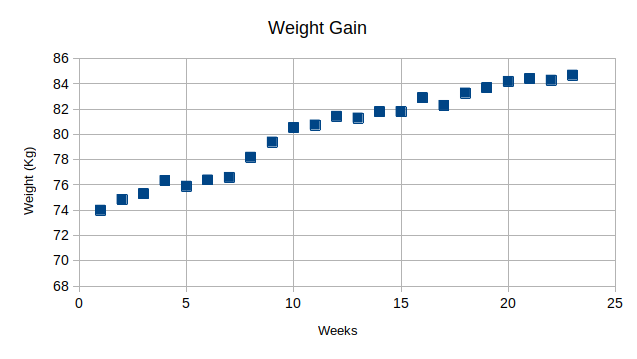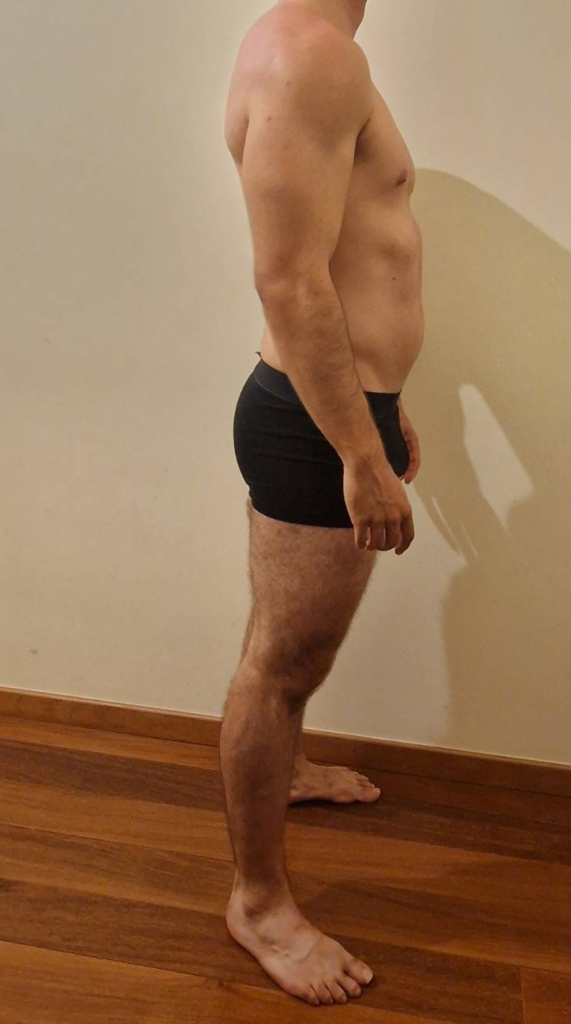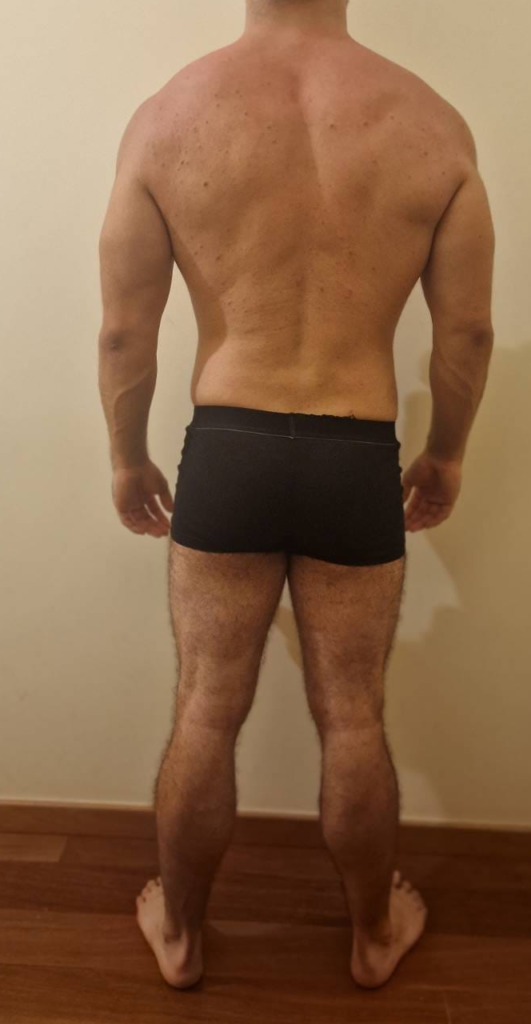In this article I’m going to show you how you can bulk up by reading about my experience in this 2022-2023 bulk.
Definition of bulk
Bulking is a phase of muscle building where you are in a caloric surplus to gain weight and do hypertrophy training to gain muscle mass.
Why it is necessary to be in a caloric surplus
Imagine this situation: you are trying to build a brick wall. You already have the wall with 10 bricks in height and the objective is to go to 20 bricks.
Now let’s say everyday in the construction process there is a thief that steals, on average, the same amount of bricks , let’s say around 5 bricks and you can’t stop him, he is always going to steal the bricks everyday( some days a bit more, some days a bit less).
In that scenario, if you bring to the construction site, on average, 5 bricks everyday(the same amount the thief steals) do you think the wall is going to get higher overtime? Of course not, because it would be physically impossible. There is no way for that wall to get higher if you are bringing the same amount of bricks per day as the thief is stealing.
If you want the wall to get higher you need to bring more bricks than the bricks that are getting stolen.
If you want to gain weight you need to eat more calories than the calories you expend everyday.
And now you ask: “ how many calories then?”
Well, let’s stay in the wall example. Imagine that you don’t know how many bricks the thief is stealing everyday (but you know that on average is more or less the same).
What you can do is take a picture everyday of how the wall is doing and if overtime the wall is getting higher that means that you are bringing more bricks than the thief is stealing (even thou you don’t know exactly how many bricks the thief is stealing)
You don’t know how many bricks the thief is stealing but if the wall is getting higher you know you are bringing more bricks.
You don’t know exactly how many calories you expend everyday (it varies overtime and depends on your activity level etc…) but if you are getting heavier in the scale overtime it means that you are consuming more calories than you are expending.
Why hypertrophy training is necessary
If you eat at a calorie surplus and do nothing else you just gain fat.
Even if you bring more bricks than the thief is stealing, but don’t actually put the bricks on the wall and glue them, then it just piles up at the construction site. The wall doesn’t get higher also.
So you need 2 things: you need to increase the amount of bricks present at the construction site and to put them in the wall.
The bricks are your nutrition, the gluing them to the wall is your training.
In very simple terms, not talking about a body recomposition situation, if you don’t eat at a caloric surplus you won’t gain weight and therefore no muscle.
If you are eating at a caloric surplus and are not training, then you won’t gain muscle, just fat.
If you are doing both, you will gain muscle (with a bit of fat also, but that is to be expected)
The plan
So my plan for this bulk (my first planned bulk) was to bulk up for around 6 months with the focus on the hamstring and chest.
The chest purely because of aesthetic reasons and the hamstring because I noticed that my quads were much more developed than the hamstrings and that is a injury risk.
The training split I followed was a 4 day (2 days at the gym and 2 home/callisthenics) workout plan, design by me. It was basically a “push” movement day + some leg exercises at the gym and a “pull” movement day at home + calve raises and abs, with the aim of hitting every muscle group 2x a week.
In terms of weight gain I aimed for at least 1kg of weight gain per month, so around at least 1.25% a month, but more than that would be fine as long as I didn’t get to fat by the end of it.
The setbacks
Around ~10 weeks in I suffered a shoulder injury. Initially I was thinking of stopping the bulk but then decided to just continue but shift the focus. So I couldn’t do any chest/shoulders exercises and focused more on glutes instead (on top of the hamstrings that didn’t change).
Then around maybe ~22 weeks in I suffered a knee injury (it was kind of a old injury I had) and had to stop training legs all together. At that point I decided that it no longer made sense to continue the bulk and just entered in a maintenance phase.
The mistakes
1) No medical examination first
rounded shoulders: https://youtu.be/SYr6lbx68n8
For a long time, maybe since the end of the second/third year of me going to the gym I had rounded shoulders.
This is a problem because if the shoulders are not in the normal place, then all the movements you do can lead to injury. Especially with heavy loads and/or a lot of times performing a given exercise.
I was doing bench press and felt the left shoulder “doing something”. It wasn’t pain. However the next day I had pain and I knew I had injured myself.
After that I did a lot of research and came to the conclusion that before I had embarked on this bulk I should have went to the doctor to have a full posture and muscle check up.
That way I could have structured the plan differently and did other things, like stretching the peck major and peck minor muscles to correct the posture.
Peck minor stretch:
2) Insufficient warm up routine
I didn’t do any warm up sets with lighter loads on the bench press for example (it was my first exercise of the routine) and didn’t do any shoulder internal and external rotations (to warm up the rotator cuff muscles)
3) No mid and lower trap work
So in my plan I lacked direct lower and mid trap work.
Because I was doing the “pull” type movements (tthat work the muscles that “bring” the shoulders backwards) at home/ at a calisthenics park, I just did pull ups. Which mainly work the lat muscles.
So the mistake was that I was training a lot the muscles that push the chest forward, like the chest, but wasn’t training the opposing muscles.
So it is important to have a complete training program.
4) No stretching/mobility routine
Has I said in the mistake 1), I should’ve also planed a stretching routine, especially to fix the rounded shoulders problem.
The weight gain (and the nutritional challenges)

So that’s the graph of my weight (in kilograms) overtime. (the average was around ~2% gain a month)
I tried to weigh myself 5x a week but I didn’t always manage to do that. Sometimes I only weighed 2 times. That’s why you can see some anomalies.
And now you ask: “but why 5x a week? Isn’t that too much? You seem like those girls with a obsession with their weight, that’s unhealthy!”
Let me give you this example: let’s say you are trying to figure out the speed of a car in a drag race.
You have 2 options:
1) you put just 1 person with a speed radar at the end of the track (so you have just 2 measurements, the initial speed which is 0 and the final speed)
2) you put 10 people spaced along the track ( sou you have a lot more measurements, 11 instead of just 2)
In the scenario 2) you have a much better understanding of the speed of the car in the entire drag race, you have a lot more information than in scenario 1).
If you weight yourself regularly you have a much better understanding of what’s happening with your body.
Around weeks 6 and 7 I was very tired because of the cumulative fatigue I accumulated: I also left a loss in appetite around that time, probably linked. I decided to take a deload week and start fresh and that solved both problems.
Around the 82Kg mark I felt again another plateau in terms of appetite. This time I had to change my diet to be more calorie dense, so that way I didn’t need to physically eat more food but I would get more calories in. One example was at dinner I changed from beans to pasta as the main carb source in the meal. 82Kg was maybe because my body wasn’t used be heavier than that for a long time (because also when I weighed more than that It was kind of a very fast change, maybe my body didn’t get used to weight that much).
Overall I didn’t have a difficult time gaining weight.
The results
Me at around ~84Kg or 185lbs







What I did right
1) I was consistent
I didn’t skip workouts and was also consistent with my meal plan.
2) I took deloads when needed
When I was getting very tired in the gym, with overall fatigue, I took a half the the training week off and trained at lower volume and intensity in the second half. That allowed me to recover and reduce fatigue.
3) I tracked my progress
I recorded in a notebook the weights and reps I did in the gy and that allowed me to try to beat my previous best and be always improving. And when I wasn’t improving (and I felt tired) I knew it was time to take a deload.
4) I improved my technique
This bulk I was trying to also improve my technique. I didn’t just watch a video or 2 and ask the trainers at the gym to show me how to do the exercise 1 time and that’s it. I was trying to get better in terms of the technique, not just lifting more weight and doing more reps.
The conclusion
If you are skinny and want to get bigger you need to be in a caloric surplus to gain muscle overtime.
Just going to the gym is not going to do it.
Avoid the mistakes I’ve made like not visiting a physiatrist to get a check up and having a incomplete or unbalanced training program.
Now off to the gym and kitchen and let’s get big.

